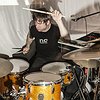Part 1.
Name: Kid Millions
Nationality: USA
Occupation: Drummer
Bands/Projects: Kid Millions, Oneida, Man Forever, People of the North, Spiritualized
Labels: Thrill Jockey, Jagjaguwar, Northern Spy
Musical Recomendations: Tal National and TIGUE
When did you start writing/producing music - and what or who were your early passions and influences?
The first music I produced and wrote was with my sisters - we had a group called The Green Apples Band and our tape was called World Gone Sour. I played kazoo, Christina played wood blocks, and Sue sang. We recorded the songs onto a Sears cassette recorder, made one tape and then I think we put it on the shelf at a Caldor department store in Torrington, CT - which was 45 minutes away. We had no idea how music distribution worked. We probably bought tapes just based on the artwork. It was hand colored with magic marker. I think we were probably in grade school.
Early passion? It was just the radio and the songs that came out of there. Charts and the radio were just a mystery to me… why certain songs were number one… I loved Michael Jackson, Prince, Devo, Simple Minds, U2, The Who and the Police. But I did not play music. I just loved it and it moved me.
What do you personally consider to be the incisive moments in your artistic work and/or career?
Probably the decision to start playing drums in high school. It was just a whim I think - but I was drawn to them. It opened up the door into the mystery of organized sound and got me over some social humps.
Next was probably the album I recorded during my senior year in high school… I did it with Bobby from Oneida - we knew each other back then. We made every mistake in the book! But there are some cool songs on that. It took away the mystery behind making records and I was able to create that necessary false sense of confidence. Sometimes it's useful to believe that what you are doing is the most amazing thing in the world. Modesty is not useful during the actual creative process.
Then it was my time immediately after college when I booked tours for Knitting Factory artists and then booked the actual club… it was 1996/97 - the last few years of their dedication to experimental music. I was introduced to so many great artists and was also given an education to the business side of booking shows and being in a band. I saw a lot of music and felt like I could slip my voice into the stream… so I did.
What are currently your main compositional- and production-challenges?
The main challenges are really money and time… money to record the music properly and the time I need to actually cultivate new work.
What do you usually start with when working on a new piece?
I try to just improvise and see what emerges. Anything that seems interesting I set aside in order to craft it into something more stable. In rare cases there is a flash of inspiration - but that only happens once in a great while... all the rest of the time I'm just trying to work everyday, practice everyday and if I'm moved by something I try to build on it.
How strictly do you separate improvising and composing?
I don't think in these terms or have any kind of conceptual relationship to one or the other.
How do you see the relationship between sound, space and composition?
I think composition is organized sound… which has to include kinds of silence - so it's all there. The more I do this, the more I find it distracting to try to conceptualize sound, silence, composition – etc. I don't even find the discussion of these concepts interesting.
Do you feel it important that an audience is able to deduct the processes and ideas behind a work purely on the basis of the music? If so, how do you make them transparent?
No - I don't think the process is important... the music is the thing. The results are the only thing. You can be curious about how someone created the effects and why they do what they do - but it's just an aside. It's like looking at your phone when you're feeling uncomfortable at a party. It's just not part of the creative process or the listening process. I am not interested in making the process transparent. The act of explaining things to an audience is part of the consumption of music as a commodity. It lubricates the transfer of the product... so it's necessary - but I don't care about it.
In how much, do you feel, are creative decisions shaped by cultural differences – and in how much, vice versa, is the perception of sound influenced by cultural differences?
I think it's probably everything… culture is everything - perhaps there are a few individuals who operate outside of that realm. But I'm not one of them. Music and culture tend to strengthen and support the status quo of the communities that support it… I'm not saying this critically - it just is.
The relationship between music and other forms of art – painting, video art and cinema most importantly - has become increasingly important. How do you see this relationship yourself and in how far, do you feel, does music relate to other senses than hearing alone?
I'm wondering why you say that the relationship has become more important? To whom? I don't understand the question really. Basically music is air moving and perceived by your ears and also in a tactile way through other senses. It gets translated by the brain which then affects other realms of perception… it's certainly related to all senses, music can get you into a meditative state of mind and in that state other thoughts and perceptions can be triggered. But who knows in what way? It's impossible to really know.






